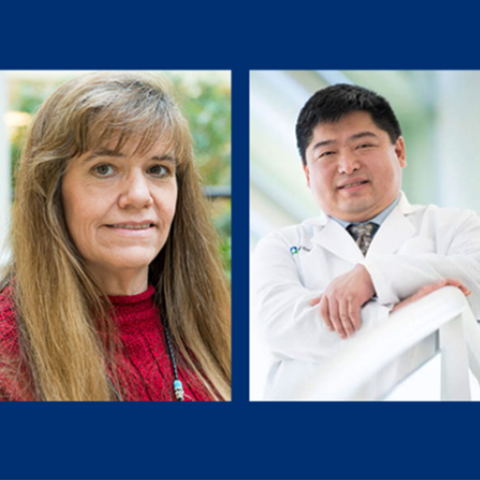Two Case Western Reserve University School of Medicine professors have been elected to the National Academy of Medicine (NAM), one of the nation’s most esteemed societies for health and medicine.
NAM membership “recognizes individuals who have demonstrated outstanding professional achievement and commitment to service.”
Elected were:
Timothy Chan, professor of medicine and chair of the Center for Immunotherapy & Precision Immuno-Oncology at Cleveland Clinic, co-director of the National Center for Regenerative Medicine at the School of Medicine and co-leader for the immune oncology program at the Case Comprehensive Cancer Center (Case CCC).
And Kim Anderson-Erisman, professor in the Department of Physical Medicine and Rehabilitation at the Center for Rehabilitation Research at MetroHealth, and associate director at the Institute for Functional Restoration.
“Dr. Chan’s nomination to become a member of the National Academy of Medicine is a well-deserved honor,” said Case CCC Director Gary Schwartz. “He is an exceptional physician scientist. His work in immuno-oncology has led to seminal advances in the field of cancer medicine. It has resulted in practice-changing approaches in the way we treat patients with immunotherapeutics today. I cannot think of a person in cancer medicine today who is more deserving of this honor.”
Chan was recognized for playing a key role in establishing the relationship between the number of mutations in a patient’s tumor and the success of immune checkpoint inhibitors. Immune checkpoint inhibitors prevent the immune system’s shutdown before the complete eradication of cancer.
“I am honored to be included and very grateful to my mentors and colleagues over the years for their support and friendship,” Chan said. “It is such a privilege to be able to work on something I care so deeply about—to improve outcomes for our patients.”
Anderson-Erisman was recognized for her research on translational investigations and bridging the gap between basic science, clinical science and the public community living with spinal-cord injury (SCI).
“Dr. Anderson’s work focuses on a key unmet medical need from discovery to implementation to help patients with spinal cord injury,” said Stan Gerson, dean and senior vice president for medical affairs at the School of Medicine. “As a member of the top (physical medicine and rehabilitation) program in the country, I am proud of her accomplishments and the team she has assembled.”
“I am incredibly honored and humbled to be included in the ranks of such highly esteemed individuals,” Anderson-Erisman said. “Everything that I have done in my career has been guided by a single goal: to help others living with spinal cord injury. Sometimes that has required me to do research that shakes up the system, and to be honored for that brings a great amount of validation.”
Chan is a renowned immuno-oncology and cancer genomics expert, who leads the Center for Immunotherapy and Precision Immuno-Oncology at Cleveland Clinic. He is also an internationally recognized expert in precision immuno-oncology and a pioneer in using genomics to determine which patients will respond best to certain types of immunotherapies.
He has published more than 280 articles in peer-reviewed journals, made landmark discoveries in his field and received numerous awards, including the National Cancer Institute Outstanding Investigator Award in 2018.
Chan earned an MD and PhD in genetics from Johns Hopkins University, where he also completed a residency in radiation oncology and a postdoctoral fellowship in the division of tumor biology. He is board-certified in radiation oncology and an elected member of the Association of American Physicians.
Anderson-Erisman is director of the Northeast Ohio Regional SCI Model System based at the MetroHealth Rehabilitation Institute.
Her training spans the spectrum of SCI research, from cellular and molecular studies to whole animal and behavioral studies, to human clinical research. Several of her studies have focused on obtaining the perspective of people living with SCI on various aspects of research, including functional priorities, acceptable benefits and risks, preferences for neuroprosthetics and exercise participation.
In addition to pursuing her own research regarding chronic injury, she was part of the leadership team running the 6 FDA-regulated Schwann cell transplantation clinical trials while a faculty member at the University of Miami.
At MetroHealth and the School of Medicine, she is continuing her leadership in clinical trials for SCI and further developing independent research addressing issues important to people living with SCI, with an emphasis on translational research to deploy treatments to the clinic.
Anderson-Erisman earned a PhD in biomedical sciences from the University of New Mexico.
For more information contact Patty Zamora at patty.zamora@case.edu.


